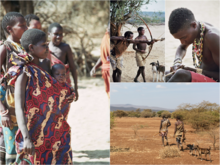Wahadzabe
Wahadzabe au Wahadza[1][2] ni kabila la Tanzania linaloishi hasa kandokando ya Ziwa Eyasi kwenye Bonde la Ufa na katika uwanda jirani wa Serengeti.




Leo Wahadza hawafikii 1,000:[3][4] kati yao 300–400 wanaishi bado kwa kuwinda na kuchuma vyakula bila uzalishaji, kama waliofanya mababu wao tangu awali.[5]
Wahadza hawana undugu wa karibu na kabila lingine lolote, na vilevile lugha yao ni ya pekee kabisa.[6][7][8]
Tanbihi hariri
- ↑ In the Hadza language, Hadzabe'e is the feminine plural form of Hadza. The Hadza call themselves the Hadzabe'e and their language Hadzane. Other spellings are Hadzapi ('they are Hadza men') and Hatsa; other ethnonyms applied to them include Tindiga (Watindiga), Kindiga, Kangeju, and Wahi. In current English usage, Hadza is the most commonly used term.
- ↑ Marlowe 2010, p. 15
- ↑ Marlowe 2010, p. 13
- ↑ Marlowe 2005 (see online)
- ↑ Marlowe 2010, pp. 17–18; 285–286
- ↑ Lee 1999, p. 200
- ↑ Sands, Bonny E. (1998) 'The Linguistic Relationship between Hadza and Khoisan' In Schladt, Matthias (ed.) Language, Identity, and Conceptualization among the Khoisan (Quellen zur Khoisan-Forschung Vol. 15), Köln: Rüdiger Köppe, 265–283.
- ↑ Ndagala & Zengu 1994
Marejeo hariri
- Apicella, C .L., & Feinberg, D. Voice pitch alters mate-choice relevant perception in hunter-gatherers. Proceedings of the Royal Society, B, 276, 1077-1082.
- Apicella, C. L., Little, A.C. & Marlowe, F.W. Averageness and attractiveness in an isolated population of hunter-gatherers. Perception, 36, 1813-1820.
- Blench, Roger (7–9 July 2008). "Hadza Animal Names" (PDF). 3rd International Khoisan Workshop. Riezlern. http://www.rogerblench.info/Language/Khoesan/Handout%20Riezlern%202008.pdf.[dead link]
- Crittenden, A.N. (2011). "The Importance of Honey Consumption in Human Evolution" (pdf). Food and Foodways 19: 257–273. doi:10.1080/07409710.2011.630618.
- Crittenden, A.N. (2008). Marlowe, F.W.. "Allomaternal Care among the Hadza of Tanzania" (pdf). Human Nature 19: 249–263. doi:10.1007/s12110-008-9043-3.
- Diamond, J. (1997). "Chapter 6". Guns, germs and steel: the fates of human societies. New York, NY: Norton. ISBN 0-393-03891-2.
- Heller, Hartmut & Keulig, Steffen. (1999) (streamed video). Hadzabe – Die letzten Wildbeuter Ostafrikas. [Documentary]. Freunde der Naturvölker e.V. (fPcN Germany). http://vimeo.com/58452890. A film (43 min) in German about this people and their struggle for survival.
- Kohl-Larsen, Ludwig (1956a). Das Elefantenspiel. Mythen, Riesen und Stammessagen. Volkserzählungen der Tindiga. Das Gesicht der Völker (kwa German). Eisenach • Kassel: Erich Röth-Verlag. The book is a collection of Hadza myths about giants, also some tribal myths about cultural heroes, and anecdotal tales.
- Lee, Richard B. (1999). The Cambridge Encyclopedia of Hunters and Gatherers. Daly, Richard Heywood. Cambridge University Press. ISBN 0-521-57109-X.
- Marlowe, F.W. (2005). "Mate preferences among Hadza hunter-gatherers" (pdf). Human Nature 15: 364–375.
- Marlowe, F. W. (2010). The Hadza: Hunter-Gatherers of Tanzania. Berkeley: Univ. California Press. ISBN 978-0-520-25342-1.
- Ndagala, D. K.; Zengu, N. (1994). "From the raw to the cooked: Hadzabe perceptions of their past". Katika Robert Layton. Who needs the past?: indigenous values and archaeology. London: Routledge. ku. 51–56. ISBN 0-415-09558-1.
- McCrummen, Stephanie. "50,000 Years of Resilience May Not Save Tribe", Washington Post, 2007-06-10, p. A01. Retrieved on 2007-09-15.
- Survival International. "Hadzabe celebrate land victory", 6 November 2007. Retrieved on 3 May 2011.
This citation will be automatically completed in the next few minutes. You can jump the queue or expand by hand
Marejeo mengine hariri
- Crittenden, Alyssa and Frank Marlowe (2008) Allomaternal Care among the Hadza of Tanzania. Human Nature: An Interdisciplinary Biosocial Perspective 19(3): 249-262.
- Finkel, M. (December 2009). "The Hadza". National Geographic Magazine. Ilihifadhi kwenye nyaraka kutoka chanzo mnamo 2009-11-21. Iliwekwa mnamo 2014-09-14. Check date values in:
|date=(help) - Kohl-Larsen, Ludwig (1956). Das Zauberhorn. Märchen und Tiergeschichten der Tindiga [The magic horn. Tales and animal stories of the Tindiga] (kwa German). Kassel: Erich Röth.
- Woodburn, James (1969). "An Introduction to Hadza Ecology". Katika Lee, Richard B.; DeVore, Irven; Wenner-Gren Foundation for Anthropological Research. Man the Hunter (toleo la 11th). Aldine Transaction. ku. 49–55. ISBN 0-202-33032-X.
- Madsen, Andrew (2000). The Hadzabe of Tanzania: land and human rights for a hunter-gatherer community. Copenhagen: International Work Group for Indigenous Affairs (IWGIA). ISBN 87-90730-26-7.
- Matthiessen, Peter (1972) The Tree Where Man Was Born, Chapter X.
- Wood, Brian and Frank Marlowe (2011) Dynamics of postmarital among the Hadza: a kin investment model. Human Nature: An Interdisciplinary Biosocial Perspective. DOI 10.1007/s12110-011-9109-5
Viungo vya nje hariri
- Hadza bibliography Archived 16 Mei 2008 at the Wayback Machine.
- Gli ultimi primitivi. Alla scoperta degli Hadzabe Documentary film (in Italian).
- Hadzabe. Retour vers l'âge de pierre. Les derniers chasseurs à l'arc de Tanzanie Documentary film (in French).
- The Hadza Bushmen of Tanzania
- Map of Hadzaland
| Makala hii kuhusu utamaduni wa Tanzania bado ni mbegu. Je, unajua kitu kuhusu Wahadzabe kama historia yake au mahusiano yake na mada nyingine? Labda unaona habari katika Wikipedia ya Kiingereza au lugha nyingine zinazofaa kutafsiriwa? Basi unaweza kuisaidia Wikipedia kwa kuihariri na kuongeza habari. |